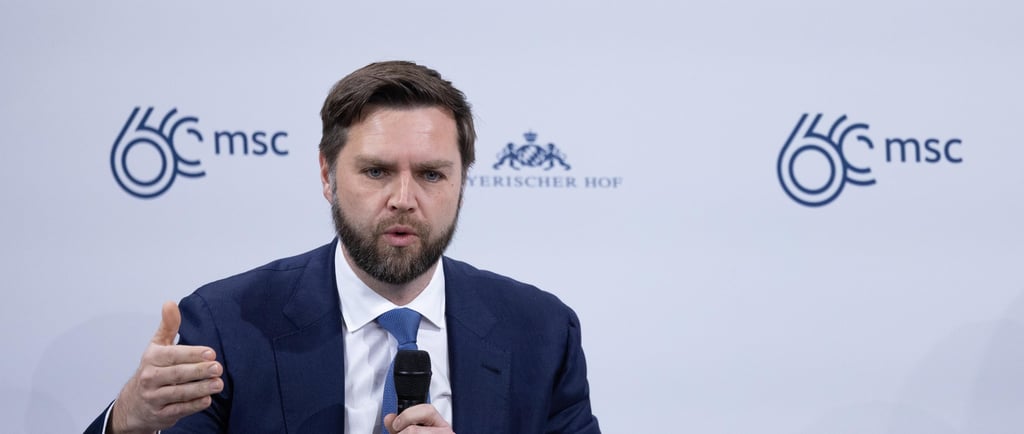Germany: Munich Security Conference Reveals Growing Rift in the Transatlantic Alliance
The Munich Security Conference of 2025 has emerged as a defining moment in the evolving relationship between the United States and Europe, highlighting profound disagreements on security, trade, and democratic governance. As tensions mount and calls for European strategic autonomy grow louder, could this mark the beginning of a fundamentally new chapter in transatlantic relations?
GERMANYUNITED STATES
Taissiya Sheguy
3/12/20253 min read


The Munich Security Conference (MSC) in 2025 marked deep cracks in the transatlantic alliance between the United States and Europe. Commenting on its results, MSC Chairman Christoph Heusgen described the forum as "a nightmare for Europeans" in an interview with the German television channel ZDF.
According to reports from the Tageszeitung (taz) newspaper, some analysts interpreted the conference as signalling fractures in the transatlantic alliance. At the same time, although the phrase concerning the end of the alliance was repeatedly heard at the forum, the consequences of what is happening do not appear to have found sufficient understanding among many of the Europeans gathered, the German newspaper pointed out.
The 61st Security Conference, which concluded in the capital of the Federal State of Bavaria, became the occasion for numerous comments from military and political experts. Among the main topics for discussion were the likelihood of ending the war in Ukraine by 2025 and the prospects for relations between the United States of America and European NATO member states.
The most discussed event of the first day of the conference was the speech of United States Vice President James David Vance. During the conference, Vance highlighted concerns about political developments in Europe, which some German commentators perceived as criticism of European democratic governance. Cicero magazine wrote that Vance “read the Europeans the riot act” on democracy, while noting the hypocrisy of such lectures given the troubles in his own country. The German Defence Minister Boris Pistorius called Vice President Vance’s remarks “unacceptable,” and Chancellor Olaf Scholz publicly rebuked Vance, stating, “That is not on – how our democracy proceeds, we decide ourselves.”
European leaders at MSC 2025 uniformly stressed that Europe must boost its own security capacity. Ursula von der Leyen declared that “when it comes to European security, Europe has to do more. Europe must bring more to the table… we need a surge in European defence spending.” Friedrich Merz, the opposition leader, also used the moment to urge European resolve. He called Vance’s speech a “wake-up call for the entire continent,” warned that a lack of leadership could make it “too late” for Europe, and vowed, “This is now more important than ever,” implying that he would restore German leadership in European security. Chancellor Olaf Scholz, in his address titled Dies muss die Stunde Europas sein (“This must be Europe’s hour”), insisted that Europe strengthen its defence capabilities “in a clearly defined timeframe.” A stronger European pillar, he argued, is a “win-win-win” – it relieves the United States, yields a “much stronger Europe,” and benefits transatlantic security.
Additionally, Ukrainian President Volodymyr Zelensky urged Europe to assume a more proactive role in regional security, emphasising that Ukraine’s long-term stability would require stronger European involvement. He used the Munich forum to call on Europe to take on more responsibility for peace. According to him, in order not to lose the war and achieve "real peace", joint pressure from the European Union and Ukraine is needed. His message alluded to the idea that without Europe's help, Ukraine risks becoming a bargaining chip in the geopolitical contest between Vladimir Putin and Donald Trump.
The escalating crisis in European Union foreign relations and the potential unraveling of the Atlantic Alliance profoundly impact businesses and economies on both sides of the Atlantic. The imposition of tariffs by the United States on European imports, such as steel and aluminium, may disrupt established supply chains, increase production costs, and lead to higher consumer prices. These protectionist measures could strain trade relations, with the European Union implementing retaliatory tariffs on American goods, further exacerbating economic tensions. This tit-for-tat escalation risks a full-scale trade war, adversely affecting industries such as agriculture, automotive, and consumer goods, and potentially leading to job losses and decreased economic growth.
In the technology sector, regulatory divergence between the European Union and the United States may also lead to challenges. The European Union’s stringent regulations, exemplified by the Digital Markets Act and the AI Act, aim to curb market dominance and ensure ethical AI deployment. However, these regulations have faced opposition from United States technology companies, supported by the Trump administration, who argue that such measures stifle innovation and create compliance complexities. This discord hampers collaboration, potentially leading to fragmented markets and hindering the growth of the global technology industry. Additionally, the uncertainty generated by differing regulatory approaches may deter investment and slow technological advancement, impacting economic competitiveness on both continents.
The European Union’s response to the changing geopolitical environment is complicated by internal divisions and the lack of a common defence strategy. Despite the recognition of the need for greater autonomy in security matters, efforts to increase defence spending and integration remain uncoordinated. National interests and bureaucratic obstacles continue to hinder the development of a common European Union defence policy.
Current dynamics indicate that the traditional Atlantic Alliance is at a crossroads. The shift in United States focus and Europe’s internal problems require a reassessment of the foundations of the partnership. For the European Union, this is an opportunity to strengthen its foreign policy mechanisms, enhance its defence capabilities, and assert greater autonomy on the global stage. The outcomes of the Munich Security Conference of 2025 have underscored significant challenges and the need for Europe to reassess its security and foreign policies.


